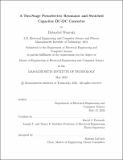A Two-Stage Piezoelectric Resonator and Switched Capacitor DC-DC Converter
Author(s)
Wanyeki, Babuabel
DownloadThesis PDF (48.03Mb)
Advisor
Perreault, David J.
Terms of use
Metadata
Show full item recordAbstract
Power converters are used in virtually every area of our lives from electric vehicle charging stations to television screens. Presently, magnetics pose a challenge for miniaturization as they fundamentally decrease in achievable power density at small scales. Our solution to this problem is to remove magnetic components altogether and instead design power converters based on piezoelectric resonators (PRs) and capacitors as the main passive elements. In previous work, we have demonstrated that PRs have high efficiencies and power density capabilities operating as dc-dc voltage regulators, but that these advantages wane for high step down ratios. Alternatively, utilizing capacitors in a switch capacitor (SC) network can provide high step down ratios with high power densities and efficiencies, but only for specific conversion ratios. By connecting the PR and SC converters together, there is an opportunity for each stage to address the drawbacks of the other in order to create a high power density and high efficiency power converter that can provide good voltage regulation and a high step down ratio. The purpose of this thesis is to investigate, simulate, and build a two-stage converter using a piezoelectric resonator and switched capacitor converter.
Date issued
2022-05Department
Massachusetts Institute of Technology. Department of Electrical Engineering and Computer SciencePublisher
Massachusetts Institute of Technology